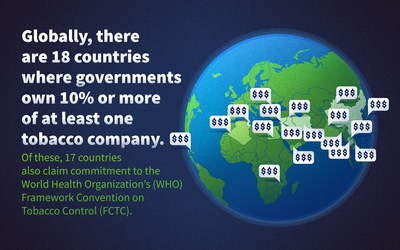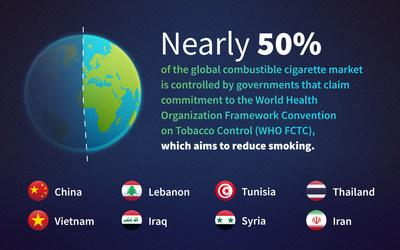New Research Identifies Contradictions and Potential Pathways for Change
NEW YORK, Sept. 17, 2020 /PRNewswire/ -- New research published by leading international business and corporate governance scholar Daniel Malan identifies inherent conflicts of interest with many of the countries leading the development of global tobacco control policy. The "Contradictions and Conflicts" report specifically identifies contradictions between governments' fiduciary responsibility to maximize state monopoly profitability and their health responsibility to minimize public health risks, as well as generate potential solutions.

According to recent data, nearly 50% of the global combustible cigarette market is controlled by governments that claim commitment to the World Health Organization Framework Convention on Tobacco Control (WHO FCTC), which seeks to "protect present and future generations from the devastating health, social, environmental and economic consequences of tobacco consumption and exposure." Eight of these FCTC countries own 100% of at least one tobacco company, including China, Iran, Iraq, Lebanon, Syria, Thailand, Tunisia, and Vietnam. Notably, China National Tobacco Corporation controls roughly 44% of the global cigarette market.
"Our research underlines a clear conflict of interest among these FCTC signatories," said Daniel Malan, Assistant Professor of Business Ethics, Trinity College Dublin; member, World Economic Forum's Global Future Council on Transparency and Anti-Corruption; and an author of the report. "FCTC's Article 5.3 requires parties to protect the implementation of their public health policies against the commercial and vested interests of the tobacco industry. Yet, this is impossible when many of the same countries are also striving to generate revenue from state-owned tobacco entities."
No One-Size-Fits-All Solution
The Contradictions and Conflicts report notes that state monopolies are not subject to multinational governance, and pressure from national government organizations has been largely ignored within the tobacco industry. There are also no clear differences in health policies or burden of disease data when compared with countries where there is no significant state ownership of tobacco companies. As a result, the WHO may find it challenging to identify a one-size-fits-all solution to this conflict of interest.
The possible solutions for governments with state-owned tobacco interests are complex. The report suggests that shifting from the production and marketing of combustible cigarettes over time to tobacco harm-reduction products could alleviate the conflicts that the state-owned tobacco enterprises face and ultimately save lives. Leading researchers and organizations such as the Foundation for a Smoke-Free World are mobilizing globally to create solutions that help expand knowledge in cessation and harm-reduction areas, including biomarker discovery, outcomes of quitting/switching on the microbiome, and innovative clinical trial designs for cessation therapies.
"The data show a clear need and opportunity to not only regulate state-owned tobacco companies, but also to encourage them to evolve their business models toward the development and promotion of innovative harm-reduction solutions," said Dr. Derek Yach, President of the Foundation for a Smoke-Free World. "More than 8 million people die from tobacco-related illnesses each year. Governments must act to directly address the long-term health and wellness of the people living in their countries."
Later this month, the Foundation for a Smoke-Free World will release the first Tobacco Transformation Index, which will reveal that leading tobacco companies are making limited, but in some cases meaningful, progress by lowering the risks of their products and addressing long-term profitability at the same time, through investments in harm reduction.
A key implication from Contradictions and Conflicts is that if state-owned tobacco companies were to accelerate efforts to integrate tobacco harm reduction into long-term corporate strategy, they would not only address the conflict, but they would also simultaneously accelerate global progress toward smoking cessation. This type of business restructuring to improve health already exists. China, for example, has embraced a similar path in regard to fossil fuels by committing its domestic auto manufacturing sector to ending production and sales of vehicles with internal combustion engines.
Commissioned by a research grant from the Foundation for a Smoke-Free World, the Contradictions and Conflicts report was co-authored by Daniel Malan and Brett Hamilton, visiting faculty member, University of Stellenbosch Business School.
The Foundation for a Smoke-Free World is an independent, US nonprofit 501(c)(3) private foundation with the mission of improving global health by ending smoking in this generation. The Foundation strives to achieve its mission by focusing its work on three core pillars: Health, Science, and Technology; the Agricultural Transformation Initiative; and Industry Transformation. The Foundation has received charitable contributions from PMI Global Services Inc. (PMI) in each of 2018 and 2019 in the amount of US $80 million. Under the Foundation's bylaws and its pledge agreement with PMI, Foundation shall maintain full independence, and shall make all its decisions on its own, free from the control, interim instructions, or influence from or by PMI or any other third parties. The Foundation's acceptance of any charitable contribution from PMI does not constitute an endorsement by the Foundation of any of PMI's products. For more information about the Foundation, please visit www.smokefreeworld.org.
MEDIA CONTACT:
Nicole Bradley
Vice President of Communications
Nicole.Bradley@smokefreeworld.org


Photo - https://mma.prnewswire.com/media/1276028/Foundation_for_a_Smoke_Free_World_Governments_Graphic.jpg
Photo - https://mma.prnewswire.com/media/1276029/Foundation_for_a_Smoke_Free_World_Globally_Graphic.jpg
Photo - https://mma.prnewswire.com/media/1276030/Foundation_for_a_Smoke_Free_World_Nearly_50_Graphic.jpg

